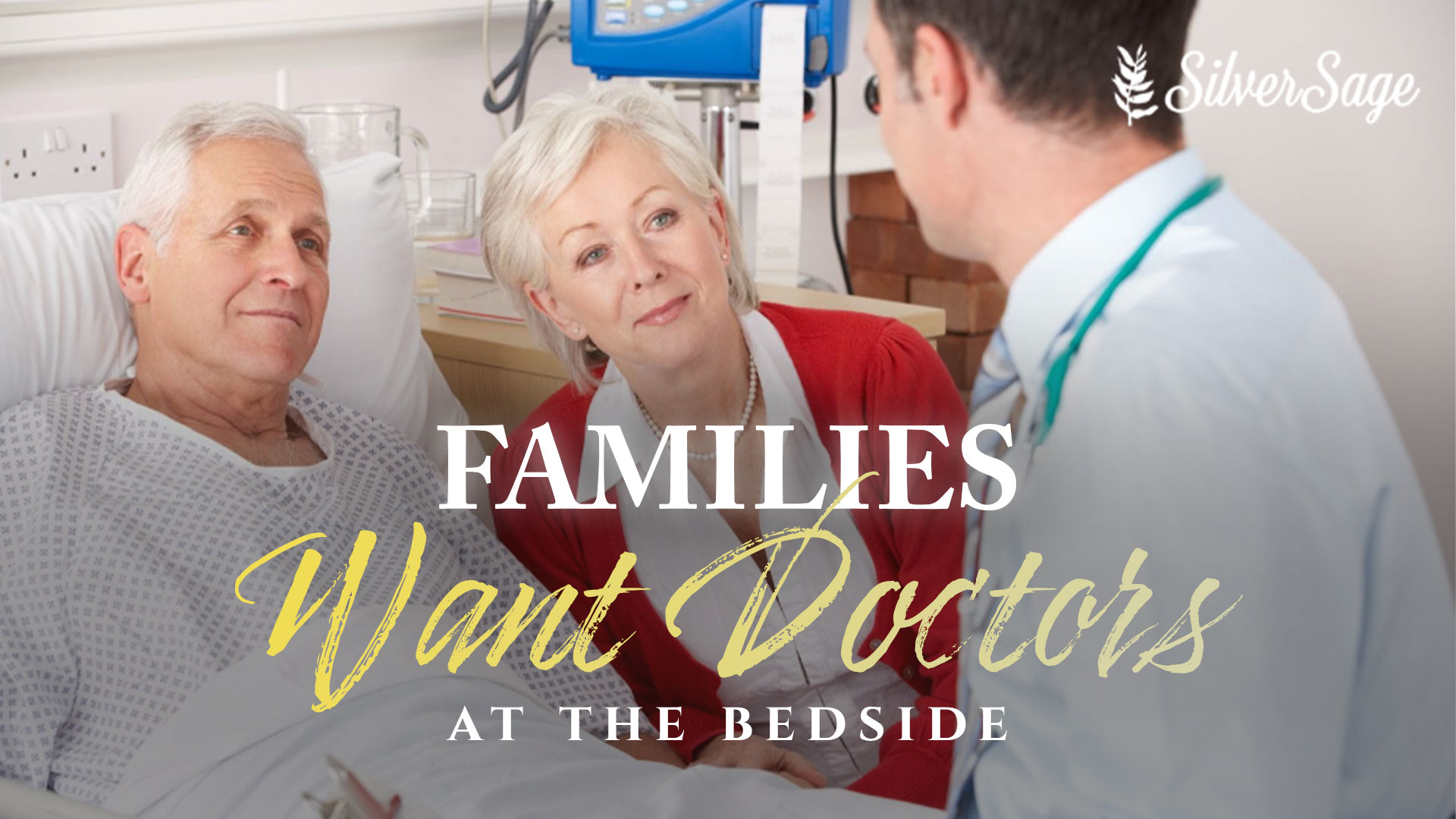Several years ago, I found myself in Nashville at the state capitol building, testifying before the health care committee for the state of Tennessee. Tennessee has a very strong law called the Corporate Practice of Medicine Law, which defines who can own a physician’s practice. This law is extremely strict, mandating that only a doctor can own a doctor’s practice. Due to this law, Life Care Centers of America, who I represented at the time, was not allowed to directly employ doctors in their nursing homes, and I was attempting to get that aspect of the law changed.
After concluding my statement, I fielded questions for about 45 minutes from the state congressmen and women serving on the committee considering changes to the law. Near the end of that session, one of the congressmen spoke up, noting that he had a statement to offer.
The congressman began describing how both he and his wife had each had one parent fall ill over the previous year. As their health continued to spiral downhill, they were each placed in nursing homes, where they eventually died.
Admittedly, this was a difficult time for the entire family, he said, going into detail about the difficulties of the decision-making process and the immense pressure these care decisions placed on them and other family members. It was bad enough that their parents were failing, but it was even harder when the rest of the family looked to them to make the right decisions on behalf of their declining parents.
In order to understand the process better, the congressman related, he and his wife asked the nursing home to allow them to speak with the medical director who was overseeing the care of their parents. They were told that the director’s usual day to be at the building was a Tuesday. On that day, they came in early and waited all day in that parent’s room, but the doctor never walked through the door.
They then called the director’s office and asked for an appointment to see the doctor. In both cases, they volunteered to pay cash for the time the doctor spent with them so they could get the needed answers to their questions. Still, they were never given an appointment. They finally went to the doctor’s office and waited most of the day, but the doctor had no time to see them.
This congressman concluded his remarks by saying, “If allowing Dr. Scott’s bill to pass will get doctors into the very facilities where the toughest decisions have to be made by families in dealing with their dying loved ones, then why wouldn’t we pass it?”
Unfortunately, even though my bill was passed, only those nursing homes willing to incorporate the model that we currently employ at SilverSage can truly say they have a mechanism to meet the needs of families like the congressman’s.
As we’ve learned through experience, it’s one thing for nursing home administrators to recognize the value of having a full-time doctor on duty in their facilities. However, it’s an entirely different challenge for them to accept the realization that they absolutely need one. In this article, I’ll show how having full-time doctors on staff at nursing homes can help families get the assurances they seek in formulating patient care, how they bring an added layer of protection above and beyond regular guidelines, and the extra benefits they offer.
Onsite Physicians Provide Reassurance from Doubt
Most nursing homes employ nurse practitioners or physician assistants to oversee the daily care of patients. These people provide a great service and accomplish enormous good. But they aren’t doctors. It’s not just a matter of good care being delivered—it’s a matter of those family members, during this critical time, wanting to hear from a doctor more than anybody else.
These families are facing questions like “Is there really nothing else to do for Mom and Dad?” or “Are we at peace deciding to keep Mom and Dad comfortable and let them pass away peacefully?” If these patients and their families are not hearing from a doctor, there’s going to be that lingering question in their mind as to whether or not they received the best possible diagnosis and evaluation.
When I was working as a medical director for nursing homes, I had people come up to me and say, “Doctor, when my loved one gets back from the hospital, I want you to take care of them because the other team only sent a nurse practitioner. I know Mom would not have had to go to the hospital if you had seen her.” Whether or not that’s true, it is definitely their perception. So for the comfort and the satisfaction of the families, having a doctor there is that important.
What families really want is a doctor by the bedside to answer their questions. This happens all the time where I work: My team and I will talk about a specific patient. Once we’ve talked over everything and the team fully understands the situation, I’ll tell them to go have a meeting with the family, but if the family wants to hear directly from me, I’ll jump on a call with them or set up another meeting. Sometimes it’s fine, and the family is satisfied after talking with my team. Sometimes, however, the family says, “We really want to hear from Dr. Scott.” So I get on the phone or call them back afterward. And they’re happy because I answer all their questions or reassure them enough that they feel good about their decision.
There’s nothing worse than having to make a life-and-death decision for your parent and then wondering afterward if you made the right choice. That’s just a heavy burden for people to bear. Doctors are uniquely qualified to ease that burden.
Guidelines Are Good, but Understanding Situations Is Better
Nursing homes generally follow set policies based on what CMS guidelines require in an effort to make sure they’re running safely. Nursing home administrations are not going to step over the line in those regards and risk getting nailed by the CMS or any governing body for not following the rules.
The administrators follow those guidelines extremely well. But it’s in understanding why those guidelines are there and really realizing where they need to be applied or adapted differently that they often fall short. That is something a doctor can anticipate and navigate, but they can only do that if they’re in-house and understanding the problems in real time.
It’s really simple for a doctor to come in for their monthly medical director meetings and say, “Oh, you should have taken that catheter out of that patient two weeks ago.” That doesn’t help the patient, and it doesn’t make the quality of care better. You need a doctor there to diagnose and resolve issues as they arise.
The nursing homes of today are not the ones of yesterday. Today’s nursing homes have really become free-standing med-surg wards—but without most of the equipment benefits afforded a hospital. Nursing homes, for example, don’t have an in-house lab, X-ray capability, additional specialists, or an emergency room. Even though patients have been moved from hospitals to nursing homes, they still need a lot of those services provided only at hospitals. And the only way to make sure they get those services in a timely manner is to have a doctor intervening early enough.
Doctors are the ones most qualified to make judgment calls in the moment to best take care of patients. “Hey, if we don’t send the patient now to the lab or get mobile X-ray to come in right now, we’re going to miss that window to treat this patient appropriately and keep them in the nursing home.” That same judgment call would be way easier for me in the hospital than in the nursing home. I could come in and say, “They’ve changed a little bit, but we’ve got some time.” And I could come back the next day or even six hours after the first visit and go, “Oh, we need an X-ray now,” and I’ve got it in 30 minutes.
That doesn’t happen in the nursing home. If you’re asking for an X-ray or lab and it’s Friday night, you’re not going to get it until Monday morning in most nursing homes. You’re not going to get it over the weekend. So, if it’s Friday afternoon, a doctor’s going to have to intervene and say, “I’m not going to wait until Monday: I need it now.” In a nursing home, the nurses might wait because the patient may not look that bad yet. And six hours later when you can’t get it, it’s too late. So it’s about having a doctor there to make judgment calls that are more complicated than in a hospital because there’s a timing factor you don’t have in a hospital to be worried about.
Full-Time Staff Physicians Offer Added Benefits
Having a full-time physician on staff is also a key cog in dealing with infectious disease, which was a huge problem in nursing homes throughout the COVID-19 pandemic. Most nursing homes have part-time physicians who only spend a limited number of hours visiting those patients. Homes with full-time physicians assigned, on the other hand, are in a much better position to recognize subtle things to prevent infectious spreads that a nursing home would not necessarily catch based on the policies and procedures that they have in place.
For example, I know of a full-time doctor who, during the first six months of COVID, walked into the rehab department at the hospital where she worked and noticed an entire new team of rehab personnel. She went to the head of the department and inquired about all the new team members and was informed that they had all been reassigned from another nearby hospital. The hospital in question had seen a lot of COVID cases there, and there was not a lot of rehab work happening.
She went straight to the administrator and asked if all the new rehab personnel had been tested for COVID. The administrator assured her they all felt fine and there was no problem. However, she persisted, telling him that they had come from a hospital where there had been a high rate of COVID exposure, and it made sense to test every one of them before mixing them in with the regular staff and patients, especially since they didn’t have any COVID cases at the time.
The administrator ordered the testing. Sure enough, one of the employees did test positive.
Now, that administrator didn’t do anything wrong based on the hospital’s policies at the time, as the therapists were already tested by the hospital’s protocol. But having a full-time physician on hand to recognize a potential weakness outside of the standard policy and to request additional testing did help prevent the potential spread in that building at the time.
As someone with three decades of experience working closely with and consulting in the nursing home industry, I know that the No. 1 determining factor for patients in their choice of nursing homes is proximity to where they or their family members live. But as they begin looking for nursing homes within their proximity, many other factors will come into play.
Today’s healthcare consumer is much smarter than those of 30 years ago, and they’ll demand homes with their best health interests—including having a full-time physician on staff—in mind. Hospitals will also weigh in, because the nursing home’s rehospitalization rate affects the hospital’s bottom line.
That’s something nursing home administrators often overlook, as it is hard for them to look at the intrinsic value of having a full-time physician on staff rather than just the cost on a spreadsheet. But other than that, I have not found another answer to problems like the one raised by the congressman from Tennessee.
Ideas are fragile and require conviction. They require knowing something is right in your gut, even when there’s no empirical physics or data to support it. But I know the work we are doing really matters, and if we persist, we will affect worthwhile change.





